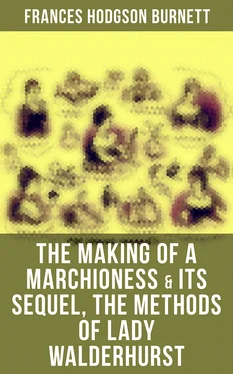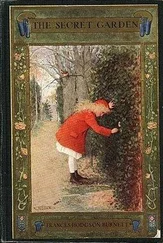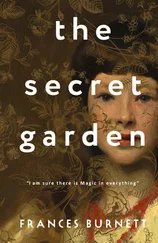“Suppose we take a brisk walk,” she would say, “and then you might try a little nap. You look a little tired.”
“Oh,” said Agatha one day, “how kind you are to me! I believe you actually care about my complexion—about my looking well.”
“Lord Walderhurst said to me the other day,” was Emily’s angelically tactful answer, “that you were the only woman he had ever seen who always looked lovely.”
“Did he?” exclaimed Lady Agatha, and flushed sweetly. “Once Sir Bruce Norman actually said that to me. I told him it was the nicest thing that could be said to a woman. It is all the nicer”—with a sigh—“because it isn’t really true.”
“I am sure Lord Walderhurst believed it true,” Emily said. “He is not a man who talks, you know. He is very serious and dignified.” She had herself a reverence and admiration for Lord Walderhurst bordering on tender awe. He was indeed a well-mannered person, of whom painful things were not said. He also conducted himself well toward his tenantry, and was patron of several notable charities. To the unexacting and innocently respectful mind of Emily Fox-Seton this was at once impressive and attractive. She knew, though not intimately, many noble personages quite unlike him. She was rather early Victorian and touchingly respectable.
“I have been crying,” confessed Lady Agatha.
“I was afraid so, Lady Agatha,” said Emily.
“Things are getting hopeless in Curzon Street. I had a letter from Millicent this morning. She is next in age to Alix, and she says—oh, a number of things. When girls see everything passing by them, it makes them irritable. Millicent is seventeen, and she is too lovely. Her hair is like a red-gold cloak, and her eyelashes are twice as long as mine.” She sighed again, and her lips, which were like curved rose-petals, unconcealedly quivered. “They were all so cross about Sir Bruce Norman going to India,” she added.
“He will come back,” said Emily, benignly; “but he may be too late. Has he”—ingenuously—“seen Alix?”
Agatha flushed oddly this time. Her delicate skin registered every emotion exquisitely. “He has seen her, but she was in the schoolroom, and—I don’t think—”
She did not finish, but stopped uneasily, and sat and gazed out of the open window into the park. She did not look happy.
The episode of Sir Bruce Norman was brief and even vague. It had begun well. Sir Bruce had met the beauty at a ball, and they had danced together more than once. Sir Bruce had attractions other than his old baronetcy and his coalmines. He was a good-looking person, with a laughing brown eye and a nice wit. He had danced charmingly and paid gay compliments. He would have done immensely well. Agatha had liked him. Emily sometimes thought she had liked him very much. Her mother had liked him and had thought he was attracted. But after a number of occasions of agreeable meetings, they had encountered each other on the lawn at Goodwood, and he had announced that he was going to India. Forthwith he had gone, and Emily had gathered that somehow Lady Agatha had been considered somewhat to blame. Her people were not vulgar enough to express this frankly, but she had felt it. Her younger sisters had, upon the whole, made her feel it most. It had been borne in upon her that if Alix, or Millicent with the red-gold cloak, or even Eve, who was a gipsy, had been given such a season and such Doucet frocks, they would have combined them with their wonderful complexions and lovely little chins and noses in such a manner as would at least have prevented desirable acquaintances from feeling free to take P. and O. steamers to Bombay.
In her letter of this morning, Millicent’s temper had indeed got somewhat the better of her taste and breeding, and lovely Agatha had cried large tears. So it was comforting to be told that Lord Walderhurst had said such an extremely amiable thing. If he was not young, he was really very nice, and there were exalted persons who absolutely had rather a fad for him. It would be exceptionally brilliant.
The brisk walk was taken, and Lady Agatha returned from it blooming. She was adorable at dinner, and in the evening gathered an actual court about her. She was all in pink, and a wreath of little pink wild roses lay close about her head, making her, with her tall young slimness, look like a Botticelli nymph. Emily saw that Lord Walderhurst looked at her a great deal. He sat on an extraordinarily comfortable corner seat, and stared through his monocle.
Lady Maria always gave her Emily plenty to do. She had a nice taste in floral arrangement, and early in her visit it had fallen into her hands as a duty to “do” the flowers.
The next morning she was in the gardens early, gathering roses with the dew on them, and was in the act of cutting some adorable “Mrs. Sharman Crawfords,” when she found it behoved her to let down her carefully tucked up petticoats, as the Marquis of Walderhurst was walking straight toward her. An instinct told her that he wanted to talk to her about Lady Agatha Slade.
“You get up earlier than Lady Agatha,” he remarked, after he had wished her “Good-morning.”
“She is oftener invited to the country than I am,” she answered. “When I have a country holiday, I want to spend every moment of it out of doors. And the mornings are so lovely. They are not like this in Mortimer Street.”
“Do you live in Mortimer Street?”
“Yes.”
“Do you like it?”
“I am very comfortable. I am fortunate in having a nice landlady. She and her daughter are very kind to me.”
The morning was indeed heavenly. The masses of flowers were drenched with dew, and the already hot sun was drawing fragrance from them and filling the warm air with it. The marquis, with hia monocle fixed, looked up into the cobalt-blue sky and among the trees, where a wood-dove or two cooed with musical softness.
“Yes,” he observed, with a glance which swept the scene, “it is different from Mortimer Street, I suppose. Are you fond of the country?”
“Oh, yes,” sighed Emily; “oh, yes!”
She was not a specially articulate person. She could not have conveyed in words all that her “Oh, yes!” really meant of simple love for and joy in rural sights and sounds and scents. But when she lifted her big kind hazel eyes to him, the earnestness of her emotion made them pathetic, as the unspeakableness of her pleasures often did.
Lord Walderhurst gazed at her through the monocle with an air he sometimes had of taking her measure without either unkindliness or particular interest.
“Is Lady Agatha fond of the country?” he inquired.
“She is fond of everything that is beautiful,” she replied. “Her nature is as lovely as her face, I think.”
“Is it?”
Emily walked a step or two away to a rose climbing up the gray-red wall, and began to clip off blossoms, which tumbled sweetly into her basket.
“She seems lovely in everything,” she said, “in disposition and manner and—everything. She never seems to disappoint one or make mistakes.”
“You are fond of her?”
“She has been so kind to me.”
“You often say people are kind to you.”
Emily paused and felt a trifle confused. Realising that she was not a clever person, and being a modest one, she began to wonder if she was given to a parrot-phrase which made her tiresome. She blushed up to her ears.
“People are kind,” she said hesitatingly. “I—you see, I have nothing to give, and I always seem to be receiving.”
“What luck!” remarked his lordship, calmly gazing at her.
He made her feel rather awkward, and she was at once relieved and sorry when he walked away to join another early riser who had come out upon the lawn. For some mysterious reason Emily Fox-Seton liked him. Perhaps his magnificence and the constant talk she had heard of him had warmed her imagination. He had never said anything particularly intelligent to her, but she felt as if he had. He was a rather silent man, but never looked stupid. He had made some good speeches in the House of Lords, not brilliant, but sound and of a dignified respectability. He had also written two pamphlets. Emily had an enormous respect for intellect, and frequently, it must be admitted, for the thing which passed for it. She was not exacting.
Читать дальше












